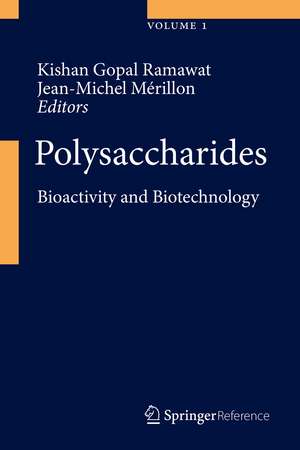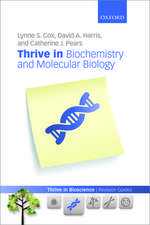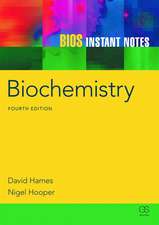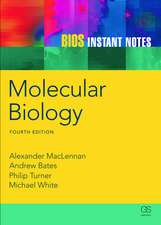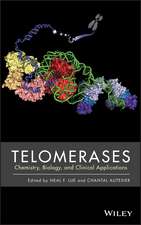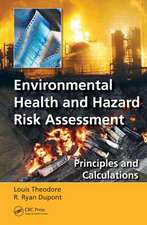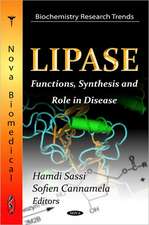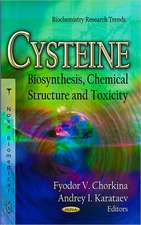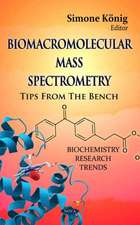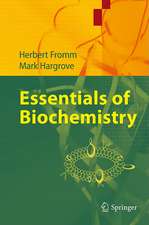Polysaccharides: Bioactivity and Biotechnology
Editat de Kishan Gopal Ramawat, Jean-Michel Mérillonen Limba Engleză Hardback – 21 iul 2015
Preț: 2740.51 lei
Preț vechi: 3605.94 lei
-24% Nou
Puncte Express: 4111
Preț estimativ în valută:
524.56€ • 569.98$ • 440.92£
524.56€ • 569.98$ • 440.92£
Carte tipărită la comandă
Livrare economică 17-23 aprilie
Preluare comenzi: 021 569.72.76
Specificații
ISBN-13: 9783319162973
ISBN-10: 3319162977
Pagini: 2328
Ilustrații: XXVIII, 2241 p. 488 illus., 252 illus. in color. In 3 volumes, not available separately.
Dimensiuni: 155 x 235 x 128 mm
Greutate: 3.67 kg
Ediția:1st ed. 2015
Editura: Springer International Publishing
Colecția Springer
Locul publicării:Cham, Switzerland
ISBN-10: 3319162977
Pagini: 2328
Ilustrații: XXVIII, 2241 p. 488 illus., 252 illus. in color. In 3 volumes, not available separately.
Dimensiuni: 155 x 235 x 128 mm
Greutate: 3.67 kg
Ediția:1st ed. 2015
Editura: Springer International Publishing
Colecția Springer
Locul publicării:Cham, Switzerland
Public țintă
ResearchCuprins
Part I Polysaccharides: Occurrence, Structure, Distribution and Biotechnology.- Polysaccharides: an introduction (overview).- Bacterial polysaccharides.- Fungal polysaccharides.- Polysaccharides from lower plants.- Polysaccharides from higher plants.- Biosynthesis of polysaccharides.- Life cycle assessment of polysaccharide materials.- Polysaccharides: applications in biotechnology.- Polysaccharides production by submerged fermentation.- Fed-batch fermentation of Tuber melanosporum for the hyperproduction of mycelia and bioactive tuber polysaccharides.- Production of polysaccharide from Agaricus subrufescens Peck on solid-state fermentation.- In vitro fermentation and prebiotic potential of novel low molecular weight polysaccharides derived from agar and alginate seaweeds.- Biopolymers from marine prokaryotes.- Carrageenan biotechnology.- Dextrans : biotechnology and applications.- Polysaccharide nanocrystals in future functional nanomaterials.- Extracellular polysaccharides from cyanobacterial soil crusts.- Polysaccharide complexes with metal cations: Structure and application.- Modified gums: Approaches and applications in drug delivery.- Part II Methods.- Method for deproteinization of bioactive polysaccharides.- Ultrasound-Assisted Extraction of water-soluble components and polysaccharides from medicinal fungi.- Quantification of polysaccharides in red wines and effect of wine-making techniques.- Extraction methods for sulfated polysaccharides from brown seaweeds.- Microwave synthesized polysaccharide copolymers.- Analytical methods for lignocellulosic biomass structural polysaccharides.- Polysaccharides as chiral selectors in capillary electrophoresis.- Turning polysaccharides into new hydrophobic materials.- Radiation processing of hydrogel and polysaccharide.- Size-exclusion chromatography of polysaccharides.- Surface properties of polysaccharides.- Polysaccharide based biopolymers as an ecofriendly alternative for synthetic polymers.- NMR spectroscopy ofpolysaccharide derivatives and their molecular structure.- Biological analysis of hetero-oligosaccharides.- Mass spectrometric characterization of oligo- and polysaccharides and their derivatives.- Part III Bioactive Polysaccharides.- Polysaccharides: applications in biology and biotechnology.- Polysaccharides: applications in medicine.- Polysaccharide -polypeptide conjugates and immunostimulant properties.- Bioactive polysaccharide from Ganoderma.- Bioactive polysaccharide of Aloe.- Extraction, structure and bioactivities of the polysaccharides from fructus.- Polysaccharides from medicinal mushrooms and their antitumor activities.- Polysaccharides from the fungus Scleroderma.- Antioxidant activities of polysaccharides from the endophytic fungus Berk.- Algal polysaccharides and health.- Sulfated polysaccharides (fucose rich) from brown seaweeds and biological activities.- Anticancer polysaccharides from natural source or mushroom.- Modified polysaccharides as drug delivery.- Natural polysaccharide hydrogels to control drug release.- Plant polysaccharides and their biological activities.- Tea polysaccharides and their bioactivities.- Chitosan-based polysaccharide biomaterials.- Gut microbia, host health and polysaccharides.- Marine polysaccharide matrices for encapsulation of vaccines in aquaculture.- Part IV Polysaccharides as Food.- Polysaccharides: structural (pectins, cellulose, xylans, gum, gumexudates, glycosamines).- Polysaccharides: storage (starch, glycogens, fructans, guar gum, minor polysaccharides).- Marine Polysaccharides (alginate and brown sea weeds, carrageenan and red sea weeds, agar, agarose, chitosan and chitin derivatives).- Bacterial and synthetic polysaccharides (dextrans, cyclodextrins, gellans, xanthan, pullulan).- Extracellular polysaccharides of microorganisms.- Pectin – An emerging new bioactive food polysaccharide.- Polysaccharides from boat-fruited Sterculia seeds/plant.- Polysaccharides from Zizyphus.- Cell wall polysaccharides from fernleaves: Evidence for a mannan-rich Type III cell wall in Adiantum raddianum.- Non-starch polysaccharides and their role in animal nutrition.- Health-promoting potential of edible mushroom polysaccharides.- Cell wall polysaccharides hydrolysis and malting barley quality.- Dietary polysaccharides and immune modulation.- Dietary fiber polysaccharides.- Milk protein - polysaccharide complexes and applications.- Inulin and health benefits.- Polysaccharides from shiitake mushrooms (Lentinula edodes) as a component of functional food.
Notă biografică
Prof. Dr. Kishan G. Ramawat is Former Professor & Head of the Botany Department, M.L. Sukhadia University, Udaipur, India, and can look back on longstanding research experience. He received his Ph.D. in Plant Biotechnology in 1978 from the University of Jodhpur, India and afterwards joined the university as a faculty member. In 1991 he moved to the M.L.Sukhadia University in Udaipur as Associate Professor and became Professor in 2001. He served as the Head of the Department of Botany (2001-2004, 2010-2012), was in charge of the Department of Biotechnology (2003-2004), was a member of the task force on medicinal and aromatic plants of the Department of Biotechnology, Government of India, New Delhi (2002-2005) and coordinated UGC-DRS and DST-FIST programmes (2002-2012). Prof. Ramawat had done his postdoctoral studies at the University of Tours, France from 1983-85, and later returned to Tours as visiting professor (1991). He also visited the University of Bordeaux 2, France several times as visiting professor (1995, 1999, 2003, 2006, 2010), and in 2005 Poland in an academic exchange programme (2005). Through these visits in France, Prof. Ramawat and Prof. Mérillon established a strong connection, which has resulted in productive collaborations and several book and reference work publications. Prof. Ramawat has published more than 170 well cited peer reviewed papers and articles, and edited several books and reference works on topics such as the biotechnology of medicinal plants, secondary metabolites, bioactive molecules, herbal drugs, and many other topics. His research was funded by several funding agencies. In his research group, Prof. Ramawat has supervised doctoral thesis of 25 students. He is an active member of several academic bodies, associations and editorial boards of journals.
Professeur Dr. Jean-Michel Mérillon is the « Directeur de l’EA 3675 (Groupe d’Etude des Substances Végétales à Activité Biologique + Polyphénols Biotech) »,at the Faculté de Pharmacie, Université de Bordeaux, Institut des Sciences de la Vigne et du Vin, in Villenave d’Ornon, France. He received his M.Pharma. (1979) and Ph.D. (1984) from the University of Tours in France. He joined the University of Tours as assistant professor in 1981, became associate professor in 1987. In 1993 he moved to the faculty of Pharmacy, University of Bordeaux, France, accepting a position as full professor. He is currently leading the “study group on biologically active plant substances” at the Institute of Vine and Wine Sciences, which comprises 25 scientists and research students. The group has been working on phenolic compounds from vine and wine for many years, mainly complex stilbenes and their involvement in health. Prof. Mérillon has supervised the doctoral theses of 19 students. He is involved in developing teaching on plant biology, natural bioactive compounds and biotechnology. Prof. Mérillon has published more than 145 research papers in internationally recognized journals, resulting in an H index of 35 (documents published between 1996 and 2015). He has co-edited books and reference works on secondary metabolites and biotechnology. Throughout his career, Prof. Mérillon has traveled widely as a senior professor. Scientists from several countries have been and are working in his laboratory, and his research is supported by funding from the Aquitaine Regional Government, the Ministry of Higher Education and Research, and various private companies. In 2004, he founded the technology transfer unit “Polyphenols Biotech”, providing support for R&D programs for SMEs and major groups from the cosmetic, pharmaceutical, agricultural and health-nutrition sectors.
Professeur Dr. Jean-Michel Mérillon is the « Directeur de l’EA 3675 (Groupe d’Etude des Substances Végétales à Activité Biologique + Polyphénols Biotech) »,at the Faculté de Pharmacie, Université de Bordeaux, Institut des Sciences de la Vigne et du Vin, in Villenave d’Ornon, France. He received his M.Pharma. (1979) and Ph.D. (1984) from the University of Tours in France. He joined the University of Tours as assistant professor in 1981, became associate professor in 1987. In 1993 he moved to the faculty of Pharmacy, University of Bordeaux, France, accepting a position as full professor. He is currently leading the “study group on biologically active plant substances” at the Institute of Vine and Wine Sciences, which comprises 25 scientists and research students. The group has been working on phenolic compounds from vine and wine for many years, mainly complex stilbenes and their involvement in health. Prof. Mérillon has supervised the doctoral theses of 19 students. He is involved in developing teaching on plant biology, natural bioactive compounds and biotechnology. Prof. Mérillon has published more than 145 research papers in internationally recognized journals, resulting in an H index of 35 (documents published between 1996 and 2015). He has co-edited books and reference works on secondary metabolites and biotechnology. Throughout his career, Prof. Mérillon has traveled widely as a senior professor. Scientists from several countries have been and are working in his laboratory, and his research is supported by funding from the Aquitaine Regional Government, the Ministry of Higher Education and Research, and various private companies. In 2004, he founded the technology transfer unit “Polyphenols Biotech”, providing support for R&D programs for SMEs and major groups from the cosmetic, pharmaceutical, agricultural and health-nutrition sectors.
Caracteristici
Offers both experienced researchers and students comprehensive information on polysaccharides Investigates one of the most widespread and most important class of organic compounds Introduces sources, identification, analysis, biosynthesis, biotechnology and applications of important polysaccharides Summarizes compounds such as starches, cellulose, chitin, gum and microbial polysaccharides Includes supplementary material: sn.pub/extras
